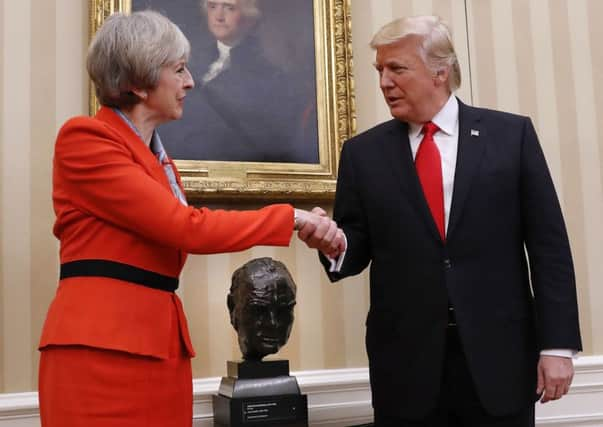YP Comment: High stakes for May and Merkel. Trump's rules of engagement


Like it or not, Britain needs America more than Germany, hence the Prime Minister’s velvet glove approach at the White House last Friday when she shored up USA support for Nato while paving the way for a favourable trade deal. To her credit, Mrs May achieved both despite last year’s Brexit vote, the precursor to Britain’s exit from the single market, leaving the Tory leader with little room for error. After all, she has far more to lose than Mrs Merkel who could afford to deploy her iron fist during a heated telephone exchange with President Trump over his betrayal of the world’s refugees as part of America’s draconian travel ban. She needs to justify her open door immigration policy ahead of national elections later this year, but she also knows that Germany’s economy has more in common with the European Union.
The added challenge is tone – and how the coarseness of social media is changing the dynamics of political debate. In 1995, President Bill Clinton vowed to deport “twice as many criminal aliens as every before, by cracking down on illegal hiring, by barring welfare benefits to illegal aliens”, a promise that led to a standing ovation from an audience of yes men and women briefed to applaud. Today’s media plurality gives a voice to all and the views of ordinary men and women on both sides of the Atlantic need to be heard. President Trump and Mrs May seem to be the two leaders who recognise this new politics, but this must not preclude the Government from expressing its disgust diplomatically when America’s leader does go too far.
Age-old questions
Advertisement
Hide AdAdvertisement
Hide AdTHE NATIONAL Health Service’s indebtedness in Yorkshire needs to be put in context. By the end of the decade, it’s set to be £2bn and could only be written off if each person living in the county paid £400.
They’re unlikely to do so, arguing that they’ve already paid their dues to HM Treasury and that this debt is the legacy of both weak leadership in NHS trusts, and also the absence of any consensus on the long-term funding of health and social care policy to take better account of the growing needs of an ageing society.
Yet, given the cost of servicing this deficit will only continue to rise and compromise the ability of hospitals to treat the sick and injured, today’s research by the respected IPPR think-tank highlights the need for a long-term funding plan to be put in place.
The dilemma is this. Most patients are incredibly grateful and appreciative of the NHS – this is illustrated by the warmth of the testimonials regularly sent to newspapers like The Yorkshire Post.
Advertisement
Hide AdAdvertisement
Hide AdMany would say more money should be spent on healthcare because fabled efficiency savings alone won’t be sufficient to balance the books. The issue is whether this can be achieved out of general taxation by the Government reconfiguring its spending priorities – the Tories do remain committed to lowering the tax threshold when the public finances permit – or the levying of a separate surcharge in which the money raised goes directly to the NHS. It is a question which cannot be put off any longer – how much are you willing to pay for the NHS? Perhaps there should be a referendum if Ministers can’t come up with an answer...
Saying mum...
IF only inspirational Leeds doctor Kate Granger was still alive in order to admonish the British Medical Association for asking NHS staff not to call mums-to-be “expectant mothers” in case it offends transgender patients. The suggested alternative is ‘pregnant people’.
A contradiction of Dr Granger’s empathetic ‘Hello, my name is...” campaign which has done so much to transform the relationship between staff and patients, the BMA would have been better off staying mum – literally. Though it is paramount that no one is victimised for their sexual orientation, the health union should have more confidence in its members saying the right thing. After all, they know their patients best of all and words like ‘love’ in Yorkshire, or ‘duck’ in Nottinghamshire and Derbyshire, are regarded as terms of endearment in these parts. Before this war of words escalates, perhaps the BMA could confirm how many people requested this politically correct prescription.